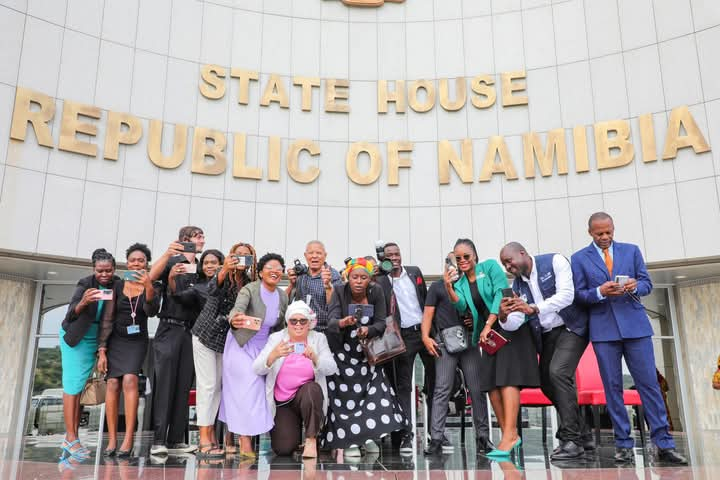I CAN almost hear the rasp of pencils being sharpened by our local commentators and economists as they prepare for the presentation of the National Budget for the next 3 years.
No doubt they will pull out the “sound bite” stuff with emotional appeal and that which suits their particular viewpoint; a couple of days of erudite analysis will follow and all will be forgotten. The next photo opportunity begs.After it has been presented, the responsible ministers will, after a suitable grace period, usually after the State of the Nation Speech (based on their carefully crafted inputs!), start bemoaning the fact that they don’t get enough dosh to do their job – and blame the Minister of Finance.Of course, conveniently forgetting the fact that the budgetary distribution is a joint Cabinet decision in which they are all consenting adults and yet more strategic plans, action plans and conferences churning out more recommendations will hit the evening news mixed in with philanthropic donations from the good and the great.The fact that these glossy-coated plans and the glitzy, multi-million “events” and their recommendations will all bear little relationship to the jointly agreed budgetary allocations and their performance needs, will be side-stepped; and how they will adjust to the, yet to be published NDP3, boggles the mind.Such is politics; such is the media; such is society; such is the state of our technical skills; such is the state of dialogue.I hope I am wrong.What I am certain of is that our Ministry of Finance will produce a budget as mandated by Cabinet and it will be quite clear what N$ resources are available, the ministerial priorities (and achievement measures?), the programme allocations and will show broad clarity of the major expenditure groups allowing managerial flexibility within their allocations (this is praise!) It will also be clear that there are some clouds on the horizon in regard to economic growth and future income – no doubt with some reference to difficulties of gaining common approaches within regional and international groupings as “alignment and harmonisation” requirements attempt to further impinge upon national sovereignty and reduce policy options in the interests (whose interests?) of world trade.I am also certain that the focus on improving tax collection will continue to bear fruit and that excesses will be used wisely (more praise) – apart, I am afraid, from keeping the national white elephant flying! Finance have to be congratulated for keeping matters under control although I am sure the “usual suspects” will have overspent with the usual pathetic excuses.On this latter point I remain pessimistic that any form of legal or managerial action will follow to redress this repetitive flouting of the law – and as such will just carry on; this is not good.Or perhaps the current erection of a scaffold at the Fiscus Building…But is the matter of taxation that I wish to address, after all no income equals no expenditure (or lots of debt).It was Louis XIV’s Finance Minister who famously described “the art of taxation as plucking the maximum number of goose feathers with the minimum of hissing ” (Quoted by Dan Roberts, UK Sunday Telegraph, 17 September 2006) and combine this with “if you want less of something, tax it!”(Bagehot, ‘The Economist’, 19th century) sort of summarises my approach.What do we tax? Profits, disposable income, imported items (almost everything) and everything we buy (nearly) – company tax, personal tax, customs and excise duties and VAT.In Bagehot’s terms we therefore appear to want smaller profits, less disposable income and make our own products more expensive; VAT bears on the poor more than those who have income and, from this perspective can be considered as anti-poor.But this is what every body else does so it must be right or is it? Is this regime best for us? Maybe it is, maybe it isn’t! Let’s dig a bit deeper while never forgetting the basic premise that GRN needs money, and ever more of it, to perform it’s function and continue to improve the lot of all Namibians.Equally successful organisations realise that continued success is dependent upon introducing change while things are good and not waiting until momentum and resources start to dwindle – simple growth curve theory, Revenue collection is no exception.Better collection of company and individual tax is a major success and has delivered windfall income but the “law of diminishing returns” will eventually kick in, the rate of increase will slow and revenue will stabilise at a higher level.The C&E rebate from SACU, as WTO driven tariff reductions continue to permeate, will ultimately reduce this source, especially worrying following the recently exposed fragility of both the SADC and SACU groupings in the AU/EU EPA negotiations.(hopefully quickly patched up); and there is a perversity in the SACU system that the more we import through / from South Africa the bigger the rebate thus providing a disincentive to local manufacture.The bilateral agreement between RSA and the EU also complicates matters although this could be to Namibia’s advantage (?).However, VAT, in general has proven itself especially when the exceptions have been minimised (fewer loopholes) but nevertheless its anti-poor bias is likely to come under scrutiny.Thus I suggest that while our current raft of taxation is currently working fine it is now the time to look at alternatives.Why? It seems to me that better collection of taxes from companies and individuals may well result in a policy perversion leading to less new internal investment, less personal spending and thus slower economic growth that is not counterbalanced by benefits of social investment (due to time lag), that C&E revenues are strategically likely to top out and then fall and that VAT is likely to come under threat.What are the alternatives? This is an episodic letter due to space – next instalment to follow sometime (editor permitting), proposals included.But first I await our Budget to be presented but to set the scene…”Know thine enemy and know your self, in a hundred battles you will never be defeated” and “(S)he whose ranks are united in purpose will be victorious” (both quotes from ‘The Art of War’, SunTzu, ca 403-221 BC).The Vision and Mission are perfectly clear despite the protestations – what really matters is that “the Ends and the Means are in harmony” (paraphrased from Aristotle, ‘The Art of Politics’).Perhaps reading official reading should include the chapter on “Making Orders Strict” in “The Book of Lord Shang” (‘Shang Yang’, again ca 403-221 BC) Let’s see what our HonMin Finance has to say.And maybe banking for all? Chris Smith csmith@mweb.com.naThe next photo opportunity begs.After it has been presented, the responsible ministers will, after a suitable grace period, usually after the State of the Nation Speech (based on their carefully crafted inputs!), start bemoaning the fact that they don’t get enough dosh to do their job – and blame the Minister of Finance.Of course, conveniently forgetting the fact that the budgetary distribution is a joint Cabinet decision in which they are all consenting adults and yet more strategic plans, action plans and conferences churning out more recommendations will hit the evening news mixed in with philanthropic donations from the good and the great.The fact that these glossy-coated plans and the glitzy, multi-million “events” and their recommendations will all bear little relationship to the jointly agreed budgetary allocations and their performance needs, will be side-stepped; and how they will adjust to the, yet to be published NDP3, boggles the mind.Such is politics; such is the media; such is society; such is the state of our technical skills; such is the state of dialogue.I hope I am wrong.What I am certain of is that our Ministry of Finance will produce a budget as mandated by Cabinet and it will be quite clear what N$ resources are available, the ministerial priorities (and achievement measures?), the programme allocations and will show broad clarity of the major expenditure groups allowing managerial flexibility within their allocations (this is praise!) It will also be clear that there are some clouds on the horizon in regard to economic growth and future income – no doubt with some reference to difficulties of gaining common approaches within regional and international groupings as “alignment and harmonisation” requirements attempt to further impinge upon national sovereignty and reduce policy options in the interests (whose interests?) of world trade.I am also certain that the focus on improving tax collection will continue to bear fruit and that excesses will be used wisely (more praise) – apart, I am afraid, from keeping the national white elephant flying! Finance have to be congratulated for keeping matters under control although I am sure the “usual suspects” will have overspent with the usual pathetic excuses.On this latter point I remain pessimistic that any form of legal or managerial action will follow to redress this repetitive flouting of the law – and as such will just carry on; this is not good.Or perhaps the current erection of a scaffold at the Fiscus Building…But is the matter of taxation that I wish to address, after all no income equals no expenditure (or lots of debt).It was Louis XIV’s Finance Minister who famously described “the art of taxation as plucking the maximum number of goose feathers with the minimum of hissing ” (Quoted by Dan Roberts, UK Sunday Telegraph, 17 September 2006) and combine this with “if you want less of something, tax it!”(Bagehot, ‘The Economist’, 19th century) sort of summarises my approach.What do we tax? Profits, disposable income, imported items (almost everything) and everything we buy (nearly) – company tax, personal tax, customs and excise duties and VAT.In Bagehot’s terms we therefore appear to want smaller profits, less disposable income and make our own products more expensive; VAT bears on the poor more than those who have income and, from this perspective can be considered as anti-poor.But this is what every body else does so it must be right or is it? Is this regime best for us? Maybe it is, maybe it isn’t! Let’s dig a bit deeper while never forgetting the basic premise that GRN needs money, and ever more of it, to perform it’s function and continue to improve the lot of all Namibians.Equally successful organisations realise that continued success is dependent upon introducing change while things are good and not waiting until momentum and resources start to dwindle – simple growth curve theory, Revenue collection is no exception.Better collection of company and individual tax is a major success and has delivered windfall income but the “law of diminishing returns” will eventually kick in, the rate of increase will slow and revenue will stabilise at a higher level.The C&E rebate from SACU, as WTO driven tariff reductions continue to permeate, will ultimately reduce this source, especially worrying following the recently exposed fragility of both the SADC and SACU groupings in the AU/EU EPA negotiations.(hopefully quickly patched up); and there is a perversity in the SACU system that the more we import through / from South Africa the bigger the rebate thus providing a disincentive to local manufacture.The bilateral agreement between RSA and the EU also complicates matters although this could be to Namibia’s advantage (?).However, VAT, in general has proven itself especially when the exceptions have been minimised (fewer loopholes) but nevertheless its anti-poor bias is likely to come under scrutiny.Thus I suggest that while our current raft of taxation is currently working fine it is now the time to look at alternatives.Why? It seems to me that better collection of taxes from companies and individuals may well result in a policy perversion leading to less new internal investment, less personal spending and thus slower economic growth that is not counterbalanced by benefits of social investment (due to time lag), that C&E revenues are strategically likely to top out and then fall and that VAT is likely to come under threat.What are the alternatives? This is an episodic letter due to space – next instalment to follow sometime (editor permitting), proposals included.But first I await our Budget to be presented but to set the scene…”Know thine enemy and know your self, in a hundred battles you will never be defeated” and “(S)he whose ranks are united in purpose will be victorious” (both quotes from ‘The Art of War’, SunTzu, ca 403-221 BC).The Vision and Mission are perfectly clear despite the protestations – what really matters is that “the Ends and the Means are in harmony” (paraphrased from Aristotle, ‘The Art of Politics’).Perhaps reading official reading should include the chapter on “Making Orders Strict” in “The Book of Lord Shang” (‘Shang Yang’, again ca 403-221 BC) Let’s see what our HonMin Finance has to say.And maybe banking for all? Chris Smith csmith@mweb.com.na
Stay informed with The Namibian – your source for credible journalism. Get in-depth reporting and opinions for
only N$85 a month. Invest in journalism, invest in democracy –
Subscribe Now!










